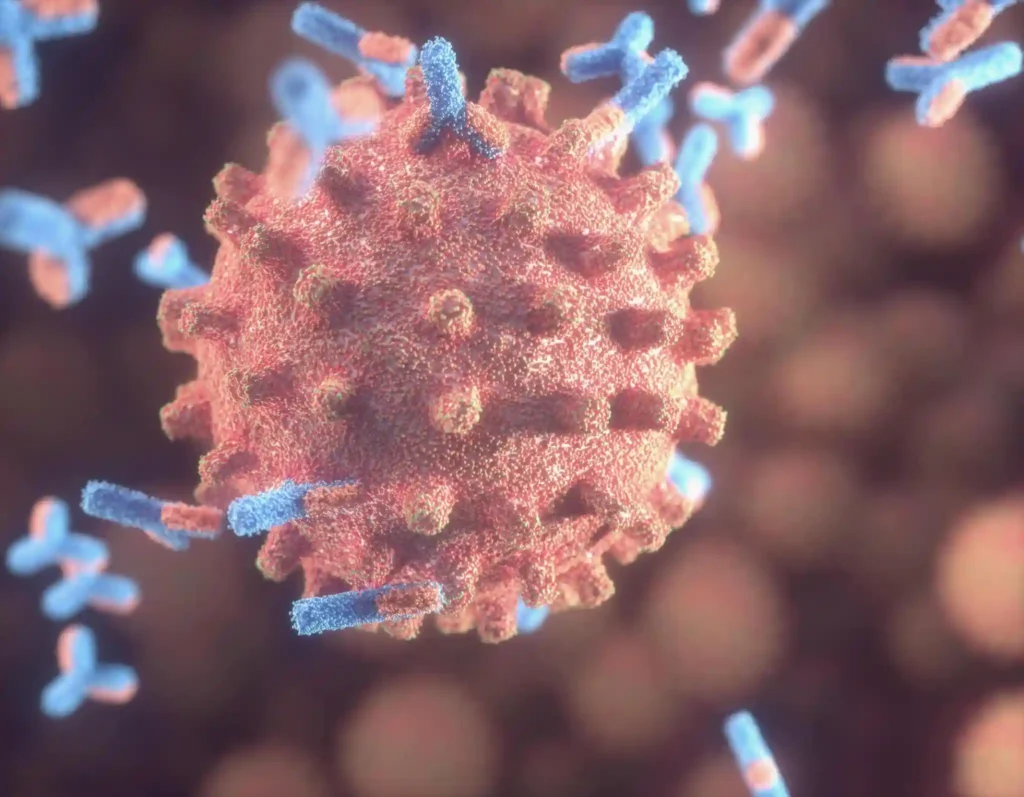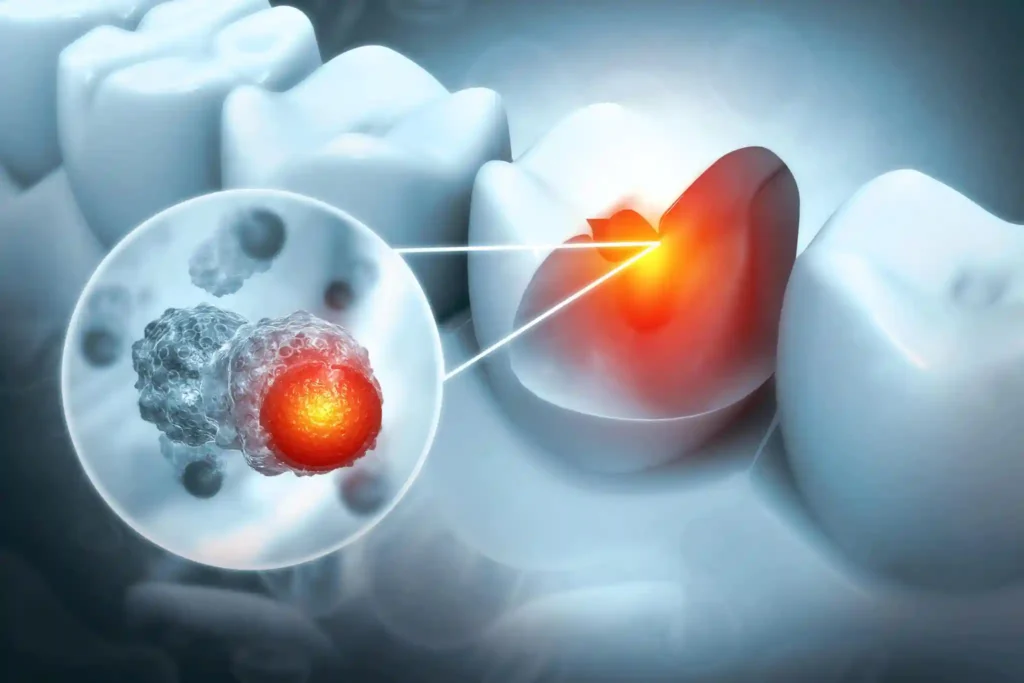Can Infected Tooth Cause Swollen Glands?

Have you ever woken up with a throbbing toothache and a mysterious lump on your jaw? You’re not alone! Many people experience the discomfort and worry that comes with an infected tooth and swollen glands.
But what’s the connection between the two? Can an infected tooth really cause your glands to swell up?
In this article, we’ll see if truly can infected tooth cause swollen glands by exploring the link between dental infections and swollen lymph nodes, helping you understand the causes, symptoms, treatment options, and prevention strategies.
By the end of this post, you’ll have a clearer picture of how to manage this common yet troublesome issue and keep your smile healthy and pain-free.
Table of Contents
Understanding the Body’s Defense System
Before we dive into the relationship between infected teeth and swollen glands, let’s take a moment to appreciate the body’s incredible defense system.
Lymph nodes, often referred to as the body’s “security guards,” play a crucial role in filtering out bacteria and fighting infection.

These small, bean-shaped structures are located throughout the body, including in the neck and jaw areas, which are particularly relevant when it comes to dental health.
When harmful bacteria or viruses enter the body, the lymph nodes spring into action, working overtime to eliminate the threat.
This increased activity can cause the nodes to swell, becoming tender to the touch and sometimes visible as lumps under the skin.
Can Infected Tooth Cause Swollen Glands?
So, how can infected tooth cause swollen glands?

It all comes down to the pathway of the infection. When a tooth becomes infected, whether due to a deep cavity, an abscess, or advanced gum disease, bacteria can accumulate in the tooth’s pulp or the surrounding tissues.
If left untreated, these bacteria can travel through the bloodstream or lymphatic system, making their way to the nearby lymph nodes in the neck and jaw.
As the lymph nodes encounter the bacteria, they begin to fight the infection, leading to inflammation and swelling.
Some common symptoms of an infected tooth include:
- Persistent pain or throbbing in the affected tooth
- Sensitivity to hot or cold temperatures
- Swelling or redness in the gums surrounding the tooth
- Bad breath or an unpleasant taste in the mouth
When the infection spreads to the lymph nodes, you may also experience:
- Tenderness or pain in the neck or jaw area
- Swollen, palpable lumps near the affected tooth
- Difficulty or discomfort when swallowing or moving your jaw
If you notice any of these symptoms, particularly if they persist for more than a few days or are accompanied by a fever, it’s essential to see a dentist promptly.
Ignoring an infected tooth can lead to more serious complications, such as the spread of the infection to other parts of the body.
Treatment Options for Infected Teeth
When it comes to taming a toothache and reducing swelling, a visit to the dentist is crucial. Your dentist will carefully examine the affected tooth and surrounding tissues, often using x-rays to determine the extent of the infection.

Based on their findings, they’ll recommend the most appropriate treatment plan.
Common treatments for infected teeth include:
- Antibiotics: In some cases, your dentist may prescribe antibiotics to help control the bacterial infection and reduce inflammation.
- Root Canal Therapy: If the infection has reached the tooth’s pulp, a root canal may be necessary to remove the damaged tissue and seal the tooth.
- Tooth Extraction: In severe cases where the tooth cannot be saved, your dentist may recommend removing the infected tooth to prevent the spread of the infection.
While waiting for your dental appointment, there are several home care tips that can help manage pain and swelling:
- Over-the-counter pain relievers, such as ibuprofen or acetaminophen
- Warm saltwater rinses to soothe the affected area and promote healing
- Applying a cold compress or ice pack to the outside of the cheek to reduce swelling
Remember, these home remedies are temporary measures and should not replace professional dental care.
Preventing Tooth Infections and Swollen Glands
Prevention is always the best medicine when it comes to maintaining a healthy smile and avoiding the discomfort of swollen glands.
Here are some simple yet effective strategies for keeping your teeth and gums in top shape:
- Brush and Floss Regularly: Maintaining a consistent oral hygiene routine is the foundation of good dental health. Brush your teeth at least twice a day with a fluoride toothpaste and floss daily to remove plaque and food particles that can lead to infection.
- Schedule Regular Dental Checkups: Visiting your dentist for routine exams and cleanings can help catch potential problems early, before they develop into more serious issues like infections and swollen glands.
- Eat a Balanced Diet: Consuming a diet rich in vitamins, minerals, and fiber can support your body’s natural defenses and promote healthy teeth and gums. Limit your intake of sugary and acidic foods, which can erode tooth enamel and contribute to decay.
Final Thoughts
In conclusion, an infected tooth can indeed cause swollen glands, as the body’s lymphatic system works to fight off the bacterial invasion.
By understanding the connection between dental health and swollen lymph nodes, you can take proactive steps to prevent and manage this common issue.
We believe you now have a clear understanding if truly can infected tooth cause swollen glands?Remember, if you experience persistent tooth pain or notice swollen glands near your jaw, don’t hesitate to seek professional dental care.
With prompt treatment and a commitment to good oral hygiene habits, you can keep your smile healthy, bright, and free from the discomfort of infected teeth and swollen glands.
Frequently Asked Questions (FAQ)
Can a wisdom tooth cause swollen glands?
Yes, wisdom tooth infections can follow the same pathway as other teeth, leading to swollen glands in the neck or jaw area.
Due to their location at the back of the mouth, wisdom teeth can be particularly prone to infection, especially if they are impacted or partially erupted.
How long will swollen glands last from an infected tooth?
The duration of swollen glands caused by an infected tooth can vary depending on the severity of the infection and the effectiveness of the treatment.
In most cases, the swelling should begin to subside within a few days of starting appropriate dental treatment, such as antibiotics or root canal therapy. However, complete healing may take longer, particularly if the infection was advanced.
Can a swollen gland from a tooth infection become serious?
In rare cases, a swollen gland caused by a tooth infection can lead to more serious complications if left untreated.
The infection may spread to other parts of the body, causing systemic symptoms like high fever, difficulty breathing, or severe neck pain. If you experience any of these symptoms or if your swollen glands persist despite dental treatment, it’s essential to seek prompt medical attention.
Are there any home remedies for a swollen gland from a toothache?
While home remedies can provide temporary relief from the discomfort of a swollen gland and toothache, they should not replace professional dental treatment.
Some helpful home care measures include taking over-the-counter pain relievers, applying warm compresses to the affected area, and gently massaging the lymph nodes to promote drainage. However, if your symptoms persist or worsen, it’s crucial to consult your dentist for appropriate care.
What if my swollen gland isn’t near my jaw?
If you notice swollen glands in other parts of your body, such as your armpits or groin, it’s unlikely that they are related to a tooth infection.
Swollen lymph nodes can have various causes, including viral infections, autoimmune disorders, or even certain types of cancer. If you have persistent swollen glands that are not associated with a known dental issue, it’s essential to consult your healthcare provider for a proper diagnosis and treatment plan.



You’re very welcome! I’m glad to hear that you’re open to exploring various topics. If you have any specific questions or areas of interest you’d like to delve into, please feel free to share them. Whether it’s about the latest advancements in technology, recent scientific discoveries, thought-provoking literary works, or any other subject, I’m here to offer insights and assistance. Just let me know how I can help, and I’ll do my best to provide valuable information and engage in meaningful discussions!
Thank you for your response! I appreciate your openness to exploring various topics. If you have any specific questions or areas of interest you’d like to discuss, please feel free to share them. Whether it’s about the latest advancements in technology, recent scientific discoveries, thought-provoking literary works, or any other subject, I’m here to offer insights and assistance. Just let me know how I can help, and I’ll do my best to provide valuable information and engage in meaningful discussions!
Attractive section of content I just stumbled upon your blog and in accession capital to assert that I get actually enjoyed account your blog posts Anyway I will be subscribing to your augment and even I achievement you access consistently fast
Usually I do not read article on blogs however I would like to say that this writeup very compelled me to take a look at and do so Your writing taste has been amazed me Thanks quite nice post
Thank you